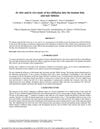 1 citations,
January 1967 in “The BMJ”
1 citations,
January 1967 in “The BMJ” The document concludes that while some hair and scalp disorders can be treated, hair loss from destroyed follicles is permanent, and damaged hair can only regrow naturally.
 1 citations,
February 1988 in “The BMJ”
1 citations,
February 1988 in “The BMJ” The document explains different hair and scalp conditions, including common hair loss after pregnancy or illness, drug-induced hair loss, hereditary excessive hair growth, patterned baldness, autoimmune hair loss, and permanent loss due to skin disease, with generally limited treatment options.
 January 2023 in “Indian Dermatology Online Journal”
January 2023 in “Indian Dermatology Online Journal” Micropigmentation is a cosmetic tattooing technique for hiding skin issues and creating permanent makeup, but it can have side effects.
 November 2011 in “Informa Healthcare eBooks”
November 2011 in “Informa Healthcare eBooks” Environmental, chemical, mechanical, and personal health factors can all damage hair and contribute to hair loss or changes in hair quality.
69 citations,
January 2002 in “Journal of biomedical optics” Dyes can penetrate human skin and hair follicles up to 1.2 mm deep and the sebaceous gland can store dye; Indocyanine Green lotion was made for safe dyeing and monitoring.
 37 citations,
October 2014 in “Maturitas”
37 citations,
October 2014 in “Maturitas” Men's hair loss is caused by hormones and genes, and can be treated with medication and surgery, while graying is due to aging and has no prevention except dyeing.
 21 citations,
July 2002 in “Clinical and Experimental Dermatology”
21 citations,
July 2002 in “Clinical and Experimental Dermatology” Hair care products don't cause hair loss if used correctly.
 9 citations,
January 1966 in “Economic botany”
9 citations,
January 1966 in “Economic botany” Plant-based ingredients in hair care are being replaced by synthetic alternatives.
 8 citations,
November 2019 in “International Journal of Morphology”
8 citations,
November 2019 in “International Journal of Morphology” Henna dye improves hair cuticle and thickness but effects vary by hair type and health.
 1 citations,
January 2021 in “Dermatology online journal”
1 citations,
January 2021 in “Dermatology online journal” A unique case showed a rare combination of two types of lichen planus on the face.
 18 citations,
March 2004 in “Clinics in Dermatology”
18 citations,
March 2004 in “Clinics in Dermatology” Lupus can cause hair loss and nail changes, with treatments available for both.
 9 citations,
November 2000 in “Proceedings of SPIE, the International Society for Optical Engineering/Proceedings of SPIE”
9 citations,
November 2000 in “Proceedings of SPIE, the International Society for Optical Engineering/Proceedings of SPIE” Dyeing hair can help target and destroy hair follicles selectively.
 2 citations,
January 2023 in “International journal of biological sciences”
2 citations,
January 2023 in “International journal of biological sciences” Gray hair can potentially be reversed, leading to new treatments.
 14 citations,
May 2011 in “Facial Plastic Surgery Clinics of North America”
14 citations,
May 2011 in “Facial Plastic Surgery Clinics of North America” Laser hair removal is effective for dark hair but needs improvement for nonpigmented or fine hairs.
 4 citations,
January 2012 in “Elsevier eBooks”
4 citations,
January 2012 in “Elsevier eBooks” The document concludes that various skin conditions have specific treatments, ranging from antihistamines for urticaria to surgery and medication for tumors and chronic skin diseases.
 17 citations,
January 2015 in “Current problems in dermatology”
17 citations,
January 2015 in “Current problems in dermatology” Understanding and treating hair disorders in different ethnic groups requires knowledge of specific hair care practices and hair characteristics.
Hair care products can cause skin irritation and allergies.
 434 citations,
October 2003 in “PTR. Phytotherapy research/Phytotherapy research”
434 citations,
October 2003 in “PTR. Phytotherapy research/Phytotherapy research” Natural products in cosmetics are beneficial for skin and hair care with low toxicity.
2 citations,
May 2020 in “Journal of the American Academy of Dermatology” Using certain hair products may increase breast cancer risk in black women.
 August 2021 in “International Journal of Research in Dermatology”
August 2021 in “International Journal of Research in Dermatology” Modern hair straightening improves manageability and strength while maintaining natural waves.
 December 2024 in “Archiv Euromedica”
December 2024 in “Archiv Euromedica” Trichoscopy is essential for diagnosing and treating autoimmune cicatricial alopecia early.
36 citations,
August 2012 in “Dermatology online journal” Using wigs, hairpieces, and sprays can help people with hair loss feel better about themselves.
 58 citations,
July 2007 in “Clinics in Dermatology”
58 citations,
July 2007 in “Clinics in Dermatology” Tattooing helps treat skin conditions, reconstruct nipple-areola, mark radiation fields, and locate lesions.
 30 citations,
May 2014 in “American Journal of Clinical Dermatology”
30 citations,
May 2014 in “American Journal of Clinical Dermatology” The conclusion is that better understanding and more research are needed to effectively manage follicular and scarring disorders in skin of color, with an emphasis on patient education and cultural awareness.
 3 citations,
January 2021 in “Wear”
3 citations,
January 2021 in “Wear” Hair's resistance to wear varies by ethnicity and treatment, with less wear indicating stronger hair.
 2 citations,
January 2019 in “Applied clinical research, clinical trials and regulatory affairs”
2 citations,
January 2019 in “Applied clinical research, clinical trials and regulatory affairs” Different countries have regulations to ensure the safety of hair care products, with some recalling hair straighteners due to high formaldehyde.
 2 citations,
January 1908 in “Journal of the American Medical Association”
2 citations,
January 1908 in “Journal of the American Medical Association” Fear of hair-related issues causes significant mental distress, especially in high-stress women.
 1 citations,
January 2013 in “Chronicles of young scientists”
1 citations,
January 2013 in “Chronicles of young scientists” Immuno-cosmeceuticals from chicken egg yolk can effectively repair and improve damaged hair.
 1 citations,
January 2012 in “International Journal of Trichology”
1 citations,
January 2012 in “International Journal of Trichology” Hair India 2012 was a successful international event focused on combating fake trichology practices and discussing various hair health topics.
 September 1983 in “Journal of The American Academy of Dermatology”
September 1983 in “Journal of The American Academy of Dermatology” Experts discussed hair care, genetic hair defects, hair loss treatments, nail surgery, lupus treatments, skin infections, and cosmetic allergies.


























